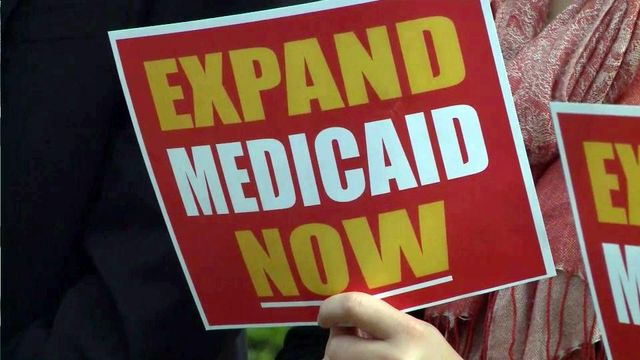McCrory says no special session on Medicaid expansion
Democratic lawmakers and several left-leaning groups say it's time to reconsider the state's decision not to expand Medicaid under the Affordable Care Act. Gov. Pat McCrory doesn't think so.
Posted — UpdatedNorth Carolina is one of 22 states that refused to expand Medicaid. The expansion was to increase the number of low-income people covered under the health care law and help offset cuts to hospital subsidies.
McCrory has said it would be foolish to expand the system that has been plagued by cost overruns, and he has pushed instead for reforming Medicaid. Legislative leaders also have questioned whether the federal government would live up to its promise to pick up the entire tab for the expansion for three years and 90 percent of the cost after that.
Since lawmakers voted in February to block any Medicaid expansion, several Republican governors in other states have changed their minds and now favor expansion, including Rick Scott in Florida, Jan Brewer in Arizona and, most recently, John Kasich in Ohio.
House Minority Leader Larry Hall said Monday that North Carolina lawmakers are experiencing some buyers' remorse as they watch federal tax dollars flow into other states. Meanwhile, he said, rural hospitals are on the verge of closing because of lower Medicaid reimbursements, and as many as half a million uninsured people in North Carolina are finding out they're too poor to qualify for federal subsidies for coverage under the Affordable Care Act.
"I've certainly had members of the House talk to me about it, about their concerns," said Hall, D-Durham. "Everyone seems to be waiting for leadership, and that leadership is in the hands of the governor – to call a special session and bring everyone back and give them the proper information."
In an appearance at The Heritage Foundation last week, McCrory seemed to hint at the possibility that he could change his mind, but he issued a statement Monday afternoon that he has no plans to call a special session.
"I will not sacrifice quality care for the people truly in need nor risk further budget overruns by expanding an already broken system," McCrory said. "Calling a special session to further expand Obamacare in North Carolina is out of the question."
House Speaker Thom Tillis and Senate President Pro Tem Phil Berger likewise scoffed at the notion of a special session, saying that the Medicaid decision has been settled.
"An expansion of Medicaid would cost North Carolina taxpayers hundreds of millions of dollars through 2021. How do these Democratic party front groups suggest we pay for it? How many teachers are they willing to fire? How high are they willing to raise the sales tax on groceries and medicine? How much are they willing to cut doctors’ and hospitals’ reimbursement rates?" Tillis and Berger said in a statement.
“If these liberal activists were truly serious about reducing the cost of health insurance, they would be in Washington protesting Obamacare, an abomination that has caused insurance premiums to skyrocket for working families," they said.
Sen. Mike Woodard, D-Durham, said North Carolina's tax money is paying for Medicaid growth in other states.
"We have the opportunity to fix this, and people are starting to ask those questions," Woodard said. "That's why the time is now for us to act, because we've elevated the dialogue to a national level."
Hospitals statewide are facing $800 million a year in cuts to reimbursement rates and would welcome a Medicaid expansion, said Don Dalton, a spokesman for the North Carolina Hospitals Association.
"Providing Medicaid or an alternative insurance option for the state's poor would open access to the health system, particularly crucial primary care. Treating illnesses at earlier, less costly stages and teaching patients how to live healthier will help reduce health care expenses and help mitigate overcrowding in hospital emergency departments," Dalton said in an email to WRAL News.
• Credits
Copyright 2024 by Capitol Broadcasting Company. All rights reserved. This material may not be published, broadcast, rewritten or redistributed.





